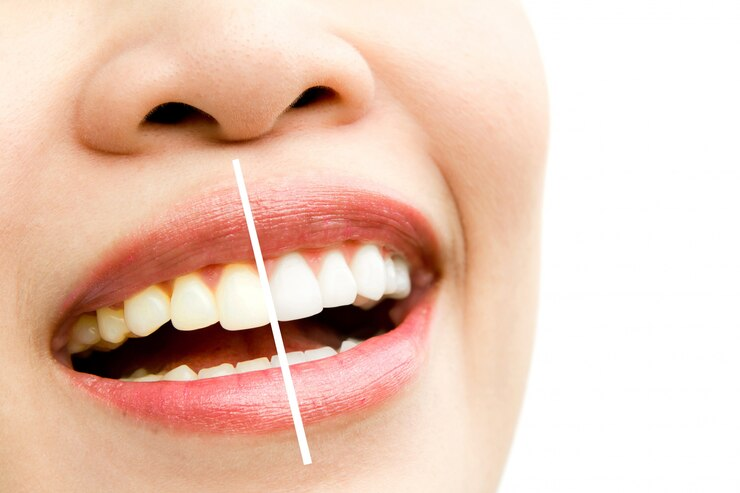Does Teeth Whitening Work on Dentures?
It involves the removal of stains and discoloration to restore a whiter and more attractive smile. Teeth Whitening in Silicon Oasis is a popular cosmetic dental procedure designed to enhance the brightness of natural teeth. This process is typically achieved using bleaching agents that help break down stains, making teeth appear several shades lighter.
Common Causes of Tooth Discoloration
Several factors contribute to tooth discoloration, leading many individuals to seek teeth whitening solutions. The most common causes include:
Dietary Habits: Frequent consumption of coffee, tea, red wine, and dark-colored foods can stain teeth over time.
Smoking and Tobacco Use: Nicotine and tar from cigarettes create yellow or brown stains on teeth.
Poor Oral Hygiene: Inadequate brushing and flossing can result in plaque buildup and surface stains.
Aging: As enamel wears down over time, the underlying dentin becomes more visible, leading to a yellowish appearance.
Medications and Medical Conditions: Certain antibiotics and medical treatments can contribute to tooth discoloration.
Benefits of Teeth Whitening
Enhanced Aesthetic Appeal
A brighter smile can improve overall facial aesthetics, making individuals feel more confident in their appearance. White teeth are often associated with good oral hygiene and a youthful look.
Boost in Self-Confidence
Having whiter teeth can positively impact self-esteem. People with bright smiles tend to feel more comfortable in social and professional settings.
Quick and Non-Invasive Procedure
Unlike other dental treatments, teeth whitening is a relatively simple and non-invasive process that can deliver noticeable results in a short amount of time.
Types of Teeth Whitening Procedures
In-Office Whitening
This procedure is performed by dental professionals using high-concentration bleaching agents for immediate and effective results. It is ideal for individuals looking for fast and long-lasting whitening effects.
At-Home Whitening Kits
At-home kits are available for individuals who prefer a more gradual approach. These kits typically include whitening gels, trays, or strips that can be used over a few weeks to achieve desired results.
Natural Remedies for Teeth Whitening
Some individuals opt for natural teeth whitening methods, such as baking soda, hydrogen peroxide, and activated charcoal. While these methods may show slight improvements, they are not as effective as professional treatments.
How to Maintain Whitened Teeth
Proper Oral Hygiene Practices
Maintaining oral hygiene is essential for preserving the results of teeth whitening. Regular brushing, flossing, and using mouthwash help prevent new stains from forming.
Avoiding Staining Foods and Beverages
Limiting the consumption of coffee, tea, red wine, and other stain-causing substances can help maintain a bright smile for a longer period.
Regular Dental Check-Ups
Visiting a dentist regularly ensures that teeth remain healthy and clean, contributing to prolonged whitening effects.
Does Teeth Whitening Work on Dentures?
Understanding Denture Composition
Dentures are made from acrylic, porcelain, or resin materials that do not respond to traditional teeth whitening treatments. Unlike natural teeth, these materials do not contain enamel, which means whitening agents cannot penetrate them effectively.
Alternative Methods for Brightening Dentures
Since conventional whitening treatments do not work on dentures, individuals can consider the following methods:
Professional Cleaning: Dental professionals can polish and clean dentures to remove surface stains and restore their brightness.
Denture Whitening Solutions: Specially formulated denture cleaning solutions can help reduce discoloration.
Proper Maintenance: Regular brushing of dentures with a non-abrasive cleaner can prevent stains and keep them looking fresh.
When to Consider Replacement
If dentures become excessively discolored or worn over time, replacing them may be the best option to achieve a bright and natural-looking smile.
FAQs
1. How long do teeth whitening results last?
The duration of teeth whitening results varies depending on individual habits and oral hygiene. With proper care, results can last from a few months to several years.
2. Can sensitive teeth undergo whitening treatments?
Yes, individuals with sensitive teeth can undergo whitening treatments, but it is recommended to use low-concentration bleaching agents or consult a dentist for suitable options.
3. Is teeth whitening safe for everyone?
Teeth whitening is generally safe, but it is best to consult a dental professional before undergoing the treatment, especially for individuals with dental conditions or restorations.
4. What foods should be avoided after teeth whitening?
After whitening, it is best to avoid foods and beverages such as coffee, tea, red wine, dark berries, and acidic foods to prevent staining and maintain results.
Final Thoughts
Achieving a whiter smile is a common goal for many individuals, and Teeth Whitening offers a variety of solutions to help brighten natural teeth. While professional and at-home whitening methods can effectively enhance the appearance of natural teeth, dentures require specialized care to maintain their brightness. Regular dental hygiene, proper maintenance, and professional guidance can ensure a long-lasting and radiant smile.




Comments
Post a Comment